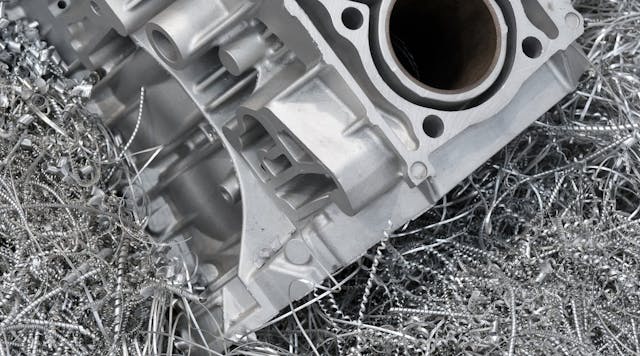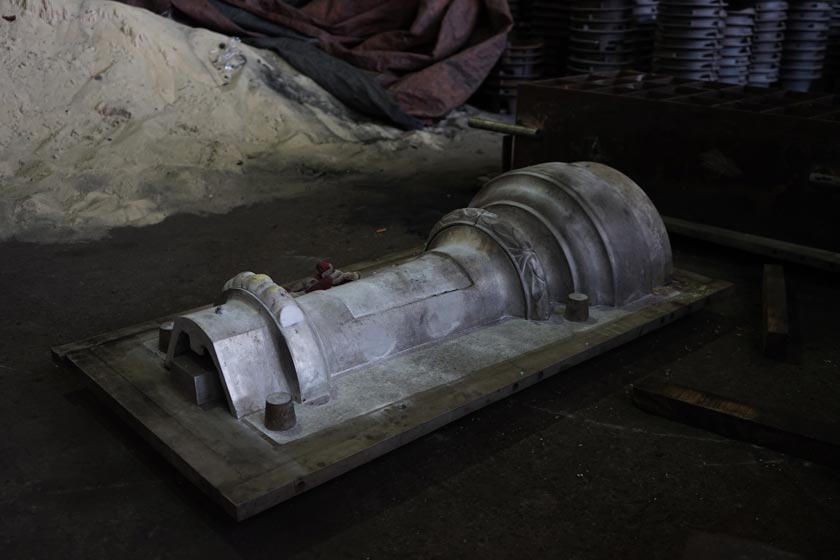Highlighting Aluminum Foundry Wisconsin for manufacturing casting needs
Understanding the Benefits and Innovations in the Aluminum Foundry Sector
The Aluminum Foundry sector plays an essential role in contemporary production. Its lightweight buildings significantly boost fuel performance, especially in vehicle and aerospace markets. In enhancement, Aluminum's resistance to deterioration assurances long life in different applications. As the industry advances, technologies such as advanced recycling and additive production are reshaping manufacturing approaches. Checking out these innovations exposes not just the benefits but additionally the difficulties ahead for Aluminum foundries in a swiftly transforming market.
The Lightweight Benefit of Aluminum
Aluminum's lightweight nature offers considerable advantages across numerous markets, especially in production and transport. Its low density permits the manufacturing of parts that are less complicated to handle and mount, causing minimized labor costs and improved performance. In the vehicle sector, lighter vehicles add to improved fuel economic situation and lower exhausts, straightening with worldwide sustainability objectives. In a similar way, in aerospace, the use of Aluminum lowers the general weight of aircraft, which is essential for improving efficiency and minimizing operational prices.
In addition, Aluminum's light-weight residential properties assist in ingenious styles that were formerly unfeasible with larger materials. This adaptability makes it possible for suppliers to produce complex forms and frameworks while keeping structural integrity. Overall, the light-weight advantage of Aluminum not only boosts item efficiency however also drives innovations in technology and layout, making it a preferred material in different applications.
Corrosion Resistance and Resilience
The Aluminum Foundry industry is renowned for creating products with superior deterioration resistance, making them ideal for numerous applications. This building, combined with improved architectural honesty, adds to the lasting performance benefits that Aluminum components supply. As an outcome, sectors progressively count on Aluminum to fulfill requiring environmental conditions without jeopardizing top quality.
Superior Corrosion Resistance
While numerous metals deal with substantial obstacles from ecological variables, Aluminum attracts attention for its exceptional corrosion resistance, making it a recommended option in lots of applications. This residential or commercial property is largely as a result of a natural oxide layer that bases on the Aluminum surface, giving an obstacle against moisture and harsh agents. Unlike various other metals that may rust or deteriorate with time, Aluminum maintains its stability also in extreme settings, such as coastal areas or commercial settings. Additionally, its light-weight nature combined with rust resistance makes it ideal for applications in aerospace, automobile, and aquatic markets. Overall, Aluminum's phenomenal longevity not only improves item durability but additionally decreases upkeep expenses, presenting an engaging advantage for consumers and manufacturers alike.
Boosted Structural Honesty
Designers and designers increasingly identify the importance of improved architectural stability in modern-day applications, where both corrosion resistance and longevity are vital. Aluminum alloys, known for their lightweight residential properties, also display exceptional resistance to rust, making them ideal for harsh atmospheres. The innovative techniques employed in the Aluminum Foundry industry contribute substantially to producing elements with enhanced durability. Advanced casting processes and alloy structures are customized to meet particular performance demands, ensuring that frameworks can endure severe problems without jeopardizing honesty. Surface treatments and finishings boost the life-span of Aluminum items, further reducing deterioration over time. This concentrate on boosted structural stability not just extends the functionality of products yet additionally reduces maintenance costs, strengthening Aluminum's position as a product of option in different markets.
Durable Performance Perks
Resilient performance in Aluminum elements is greatly credited to their exceptional deterioration resistance and sturdiness. Unlike lots of steels, Aluminum naturally develops a safety oxide layer, which prevents rust and degeneration in numerous settings, consisting of industrial and aquatic setups. This inherent residential or commercial property significantly prolongs the lifespan of Aluminum products, minimizing maintenance and substitute prices. On top of that, the light-weight nature of Aluminum boosts its applicability throughout industries without compromising strength. The product's resistance to damage also adds to its dependability sought after applications, making it an ideal selection for automobile, aerospace, and construction fields. As markets progressively focus on sustainability and durability, Aluminum's performance benefits straighten with modern-day engineering needs, strengthening its duty in cutting-edge manufacturing processes.
Ecological Influence and Sustainability
 As the Aluminum Foundry sector progresses, it significantly prioritizes ecological effect and sustainability, recognizing the demand for accountable practices despite climate adjustment. Efforts to minimize waste and energy intake go to the leading edge, with several foundries taking on recycling efforts to redeem Aluminum scrap. This not just lowers basic material use yet also significantly lowers energy expenditure, as recycled Aluminum needs just a portion of the power contrasted to key production.
As the Aluminum Foundry sector progresses, it significantly prioritizes ecological effect and sustainability, recognizing the demand for accountable practices despite climate adjustment. Efforts to minimize waste and energy intake go to the leading edge, with several foundries taking on recycling efforts to redeem Aluminum scrap. This not just lowers basic material use yet also significantly lowers energy expenditure, as recycled Aluminum needs just a portion of the power contrasted to key production.Additionally, advancements in discharges manage innovations are being applied to decrease air toxins, lining up operations with stricter ecological regulations. Shops are additionally discovering alternate power resources, such as solar and wind, to power their facilities sustainably. By cultivating collaboration with stakeholders, the industry intends to develop cutting-edge check out this site solutions that enhance eco-friendly stewardship. Jointly, these efforts highlight a commitment to reducing the Aluminum Foundry's carbon impact while advertising a circular economic climate within the manufacturing sector.
Advanced Production Techniques
 Changing production procedures, the Aluminum Foundry industry is significantly integrating sophisticated manufacturing techniques to boost efficiency and accuracy. Techniques such as computer system mathematical control (CNC) machining and additive manufacturing have actually arised as crucial elements in maximizing production operations. CNC machining enables high-precision element manufacture, considerably reducing material waste and manufacturing time. On the other hand, additive production opens new methods for complicated geometries and light-weight designs that were formerly hard to accomplish.
Changing production procedures, the Aluminum Foundry industry is significantly integrating sophisticated manufacturing techniques to boost efficiency and accuracy. Techniques such as computer system mathematical control (CNC) machining and additive manufacturing have actually arised as crucial elements in maximizing production operations. CNC machining enables high-precision element manufacture, considerably reducing material waste and manufacturing time. On the other hand, additive production opens new methods for complicated geometries and light-weight designs that were formerly hard to accomplish.Additionally, the deployment of automation and robotics in Aluminum shops enhances operations, decreases human error, and enhances worker security. These modern technologies facilitate a more responsive manufacturing environment, allowing manufacturers to adapt quickly to market needs. The assimilation of advanced simulation software program further enhances the design and testing phases, leading to exceptional product quality. Collectively, these techniques not only improve operational efficiency but also foster innovation, positioning the Aluminum Foundry industry at the forefront of Read More Here modern-day production.
Innovations in Reusing Procedures
The Aluminum Foundry industry is not only advancing in making methods however is also making significant strides in reusing processes. Developments are arising to improve the effectiveness of recycling approaches, minimizing energy intake and enhancing sustainability. Advanced sorting technologies, such as computerized optical sorting, make it possible for the identification and splitting up of Aluminum from other materials with high accuracy. This results in a greater high quality of recycled Aluminum, which is important for keeping the stability of the end products.
Furthermore, closed-loop recycling systems are being implemented, permitting producers to recycle Aluminum scrap within their own manufacturing processes. This minimizes waste and advertises a round economic climate. Additionally, study right into brand-new recycling methods, such as hydrometallurgical procedures, supplies the potential for recuperating Aluminum from complex waste streams. These advancements not only add to minimizing the carbon impact of the Aluminum Foundry market yet also boost its financial practicality in a significantly ecologically aware market.
Applications Across Different Industries
Countless industries read this post here are progressively identifying the flexibility and advantages of Aluminum Foundry products, bring about widespread applications throughout markets such as automobile, consumer, aerospace, and building and construction products. In the automotive industry, Aluminum castings add to light-weight lorry designs, enhancing gas efficiency and performance. Aerospace manufacturers use Aluminum elements for their strength-to-weight ratio, vital for aircraft structures and components.
In building, Aluminum is favored for its durability and resistance to rust, making it perfect for home window structures, roofing, and structural assistances. Customer products additionally benefit from Aluminum Foundry products, as seen in kitchenware, electronics, and packaging, where light-weight and recyclable products are crucial.
The adaptability of Aluminum Foundry strategies permits complex designs and exact specifications, providing to the diverse requirements of these sectors. Consequently, Aluminum Foundry items are coming to be important to modern production procedures throughout numerous industries.
Future Patterns in Aluminum Foundries
As sectors remain to advance, Aluminum foundries are positioned to welcome numerous vital trends that assure to improve efficiency and sustainability. One prominent trend is the boosting adoption of digital innovations, including automation and expert system, which improve operations and improve quality control. Additionally, the press in the direction of sustainable techniques is leading factories to purchase recycling technologies, considerably minimizing waste and energy usage.
 Another arising fad is using sophisticated alloys and products, satisfying the growing demand for resilient and lightweight elements across numerous sectors (Aluminum Foundry). In addition, the combination of additive manufacturing strategies is expected to revolutionize component layout, supplying customization and minimizing lead times
Another arising fad is using sophisticated alloys and products, satisfying the growing demand for resilient and lightweight elements across numerous sectors (Aluminum Foundry). In addition, the combination of additive manufacturing strategies is expected to revolutionize component layout, supplying customization and minimizing lead timesPartnership with study establishments is additionally anticipated to drive development, as foundries seek to establish brand-new processes and products. Aluminum Foundry. Collectively, these patterns suggest a transformative future for the Aluminum Foundry sector, lining up with wider objectives of sustainability and effectiveness
Regularly Asked Inquiries
What Are the Regular Costs Connected With Aluminum Foundry Production?
The common expenses connected with Aluminum Foundry manufacturing consist of raw products, labor, power, tools maintenance, and overhead expenses. These factors collectively influence the general monetary investment required for efficient Aluminum spreading operations.
Exactly How Does Aluminum Compare to Various Other Steels in Toughness?
Aluminum, while lighter than several metals, displays outstanding strength-to-weight proportions. Contrasted to steel, Aluminum is much less strong however provides exceptional rust resistance, making it a beneficial option in applications where weight and resilience are vital.
What Precaution Are in Place in Aluminum Foundries?
Safety procedures in Aluminum factories commonly consist of mandatory personal protective tools, ventilation systems to manage fumes, regular devices maintenance, training programs for employees, and adherence to strict safety policies to lessen risks related to liquified metal handling.
Exactly How Is Top Quality Control Managed in Aluminum Spreading Processes?
Quality assurance in Aluminum spreading procedures entails rigorous assessments at various phases, consisting of resources evaluation, process surveillance, and end product testing. Techniques such as analytical process control and non-destructive testing guarantee adherence to market requirements.
What Qualifications Are Crucial for Aluminum Foundry Providers?
The value of qualifications for Aluminum Foundry suppliers includes ISO 9001 for quality management, ISO 14001 for ecological administration, and industry-specific standards like ASTM and SAE, guaranteeing compliance, safety, and reliability in producing procedures.
The Aluminum Foundry industry plays a crucial role in contemporary manufacturing. The Aluminum Foundry market is renowned for creating products with premium deterioration resistance, making them perfect for different applications. Reinventing manufacturing procedures, the Aluminum Foundry sector is significantly incorporating advanced manufacturing techniques to enhance effectiveness and precision. The Aluminum Foundry market is not just progressing in producing methods yet is additionally making substantial strides in reusing procedures. As sectors continue to evolve, Aluminum foundries are poised to accept a number of vital patterns that guarantee to improve effectiveness and sustainability.